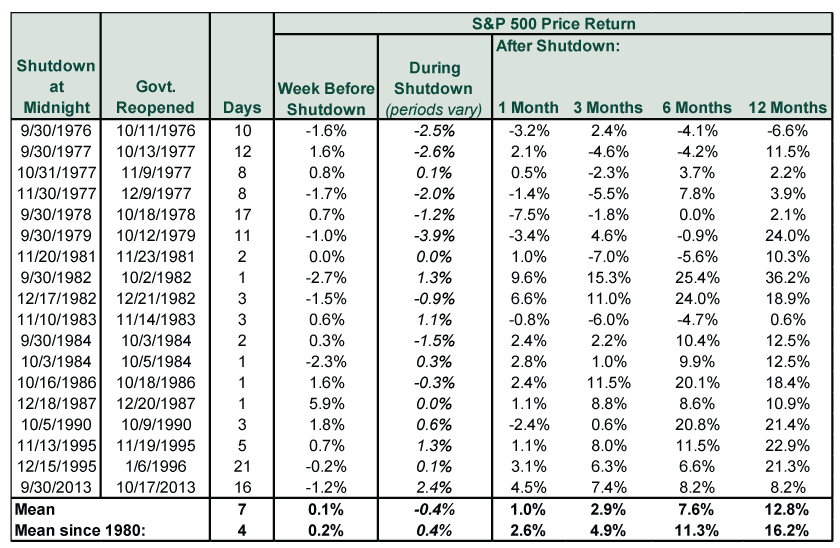Personal Wealth Management / Politics
Don't Sweat the Shutdown Stunt
On that potential government shutdown.
As you may have gleaned from the televised yacking and frantic tweeting, Congress is racing the clock to avoid a government shutdown. They have until midnight Friday. For those of you who find this phrasing as painfully ambiguous as we do, this means the midnight between Friday and Saturday. As we write, all sides (House, Senate, White House, Republicans, Democrats and caucuses within each party) are far apart, and most see little hope for a deal. On cue, media is rife with speculation about the potential stock market impact. In our view, whether or not Congress kicks the can at the last minute, investors should stay cool. No shutdown has ever caused a bear market or recession, and we see no reason this time should be different. Look past any short-term wiggles, and stay focused on the longer term.
If this sounds familiar, it is because we had four shutdown nail-biters last year. Each time, Congress managed an eleventh-hour deal to kick the can for a few weeks or months, keeping the government open, civil servants at work, campers and hikers enjoying national parks, and economic data online (thanks for that). Some lawmakers have talked of doing the same this time, but others don’t want to. (We suspect this has something to do with midterms looming in November and vulnerable lawmakers not wanting to rock the boat, lest their competition accuse them of endangering the republic by not helping the government stay open). So all the contentious budget issues are back in the fore, along with some other things lawmakers have tried to duct tape to it, like Deferred Action for Childhood Arrivals legislation (that would protect immigrants who came to America as children from deportation) and the Children’s Health Insurance Program, or CHIP. (For more on the debate over either, see Twitter.)
House leaders say they expect to vote tonight on a bill to delay a potential shutdown until mid-February, giving Capitol Hill a few more weeks to compromise on long-term funding issues. While it appears to have broad GOP support in the House, Senate passage looks iffy, to say the least. Republican senators aren’t unanimously in favor, and only one Democrat—West Virginia’s Joe Manchin—has signaled support. Stranger things have happened than a bunch of squabbling, spotlight-hungry politicians reaching compromise in 32 hours or less, but we learned long ago not to hold our breath.
If the government shuts down, we might see some market volatility—just normal sentiment-driven wobbles. Media shutdown hype can rattle investors’ nerves, and that can register in stock prices. Then again, volatility isn’t a given. Markets might already have dealt with this widely discussed issue. Either way, what matters for stocks isn’t what happens over the next few weeks. Markets move most on events 3-30 months out, not 3-30 days. Said differently, whether the government shuts down for a while shouldn’t meaningfully hit corporate profitability over the next one, two, three or more years. This is probably why none of the other 18 shutdowns since 1976 brought a meaningful downturn, as the nearby table shows. Returns during the shutdowns themselves are variable, but returns afterward are positive much more often than not. No bear market ever began with or because of a government shutdown. Nor did any recession.
While we could easily write off current fears by reminding you that “it’s different this time” are the four most dangerous words in the investing world, we don’t like being dismissive, so let us instead consider some facts. Federal government spending and investment is just 6.7% of GDP, and a short-lived shutdown will not wipe all of this out.[i] While the federal government employs over 2.8 million people, this includes over 600,000 employees of the US Postal Service—they aren’t furloughed in a shutdown.[ii] Other “essential” government employees will also continue clocking in. Those who do get some unwanted time off will probably receive back pay once they are back at work, as Congress usually includes this in the shutdown resolution bill. That is a long way of saying the impact on consumer spending should be negligible. More importantly, over 80% of US economic activity occurs in the private sector, where shutdowns have little influence. Those running campgrounds, hotels and restaurants by national parks will probably see a temporary hit, but broad, macro-level impact should be muted. (And it is January, which isn’t exactly high season at Yellowstone and many other parks.)
Most importantly, markets are global, and the US is less than one-fourth of the global economy. We daresay a US government shutdown means next to nothing for firms in Europe and Asia. A German firm claiming an earnings hit from a US government shutdown would be odd indeed.
So, if Congress hasn’t compromised by the time you read this, don’t sweat it. We expect any short-term volatility tied to this to pass quickly—stocks are very good at moving on from shutdowns.
Exhibit: US Stock Returns Surrounding Government Shutdowns
Source: FactSet, as of 10/16/2017. S&P 500 price returns in the periods shown.
If you would like to contact the editors responsible for this article, please message MarketMinder directly.
*The content contained in this article represents only the opinions and viewpoints of the Fisher Investments editorial staff.
Get a weekly roundup of our market insights
Sign up for our weekly e-mail newsletter.

You Imagine Your Future. We Help You Get There.
Are you ready to start your journey to a better financial future?

Where Might the Market Go Next?
Confidently tackle the market’s ups and downs with independent research and analysis that tells you where we think stocks are headed—and why.






